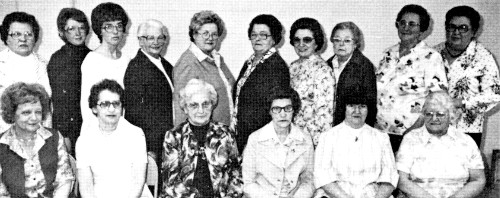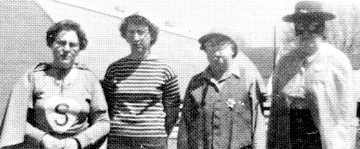
The first celebration was held in 1965, and was mostly sponsored by the Aspinwall Co-op. Co-op manager Keith Clifford, along with other people in the community, came up with the idea of having a free pork barbecue; $1.00 raffle tickets would be sold for prizes and a few gambling stands would be operated as ways to offset the costs of the barbecue. Prizes were no small items; they started with a $1,500 TemKen trailer, a chain saw for the second prize and a dishwasher for the third prize. A $155 mini-bike was also given to the winner of a children's drawing, with all kids under 15 able to participate in the free registration.
The free meal was a feast! It included 2,000 pounds of pork, 4,000 half-pints of milk, 4,000 chocolate and strawberry ice cream sundaes, 150 gallons of pork 'n beans, 24 gallons of sliced pickles, 100 pounds of potato chips, 60 pounds of coffee and 5,000 buns.
The free barbecue was sponsored by the Coop for five years; by 1970, the celebration had grown so large the Co-op turned it over to the town. The Aspinwall Community Club was formed at that time, although the club was not formally organized until 1976. Roy Schilling was elected the first president, Shirley Spack was the first secretary-treasurer, and various committees were named.
The ice cream sundaes have been discontinued from the meal and the prizes have changed; otherwise, the event has remained nearly the same throughout the years. It has continued to be a party for all ages, with entertainment ranging from 10c fish ponds for toddlers, ring toss and the paddle wheel for school kids, dart toss and the bell ringer for teens, and bingo, gambling, and refreshments for adults.
The celebration was not held in 1972 because of the crackdown on all gambling in Iowa by then State Attorney General Richard Turner; the barbecue and games were started again in 1973, and have been scheduled for the second Saturday of August each year since.
Prizes have included campers, power lawn mowers, portable dishwashers, air conditioners, televisions, microwave ovens, meat, a live hog, cash, and a round trip for two to Las Vegas. A local couple, Nancy Stoberl and Calvin Stammer, won the trip in 1975 and used it a month later for their honeymoon.
A lighted sign saying "Aspinwall" at the Highway 141 turnoff was purchased from the proceeds of the celebration, but for the most part, the profits were put into a savings account, which grew to about $10,000. In 1975, the Emma Rowedder property was purchased and plans launched for the construction of a community building.
In January, 1976, the non-profit organization called the Aspinwall Community Club was formed. Nine directors were elected, with Everett Christensen, Merton Ross, and Milo Stammer named to one-year terms, Raymond Ehlers,

Continued from page 155
Alvin Jansen, and Audrey Phillips named to two year terms, and Luella Musfeldt, Chris Brandt and Darlene Vollstedt named to three year terms. Chris Brandt, who had been elected president of the former club in 1975, and Luella Musfeldt, secretary-treasurer since 1973, were elected by the board to keep these positions. Raymond Ehlers was elected vice-president.
An annual meeting is held every January, and three new directors are voted in for three year terms. The 1982 board includes president Dennis Kasparbauer, vice-president Daryl Dammann, secretary-treasurer Chris Brandt, and directors Allen Ehlers, Gene Lohrmann, Joyce Vinke, Luella Musfeldt, Keith Kerkhoff and Clarence Bowers.

COMMUNITY BUILDING ERECTED IN 1976
Plans for the community building got underway during the spring of 1976, and in
July, the old house on the Rowedder property was torn down. Dirt was hauled in
and packed, and cement for the floor was poured August 10. Women of the
community served lunch for the workers.
The building, 46 feet wide and 96 feet long, was planned with two restrooms, a large kitchen, store room, and a huge recreation hall. It was built entirely by volunteer help, with townspeople and farmers from the area bringing tractors, hammers and their individual talents.
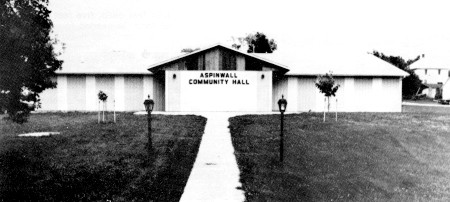
Continued from page 156
Before winter, the structure was completed and the cabinets, built by Rasmussen Lumber and finished by club members, had been installed. Furnaces and air-conditioning were added and the open house was held Sunday, February 20, 1977, with an attendance of about 250.
Tables, chairs, dishes, stoves and refrigerators have been purchased for the building, which is available for rent for wedding receptions and parties. A women's Auxiliary was organized in 1978, which can be hired to do the serving for these events.
In addition to the yearly celebrations, the Community Club sponsors two annual $15 donation dances, one for St. Patrick's Day and the other a Halloween Masquerade Dance. Proceeds go for the improvements for the building such as a built-in coat rack, an entryway for the west entrance, and the addition of doors to the north and south of the building. More air-conditioning was added this last year, too.

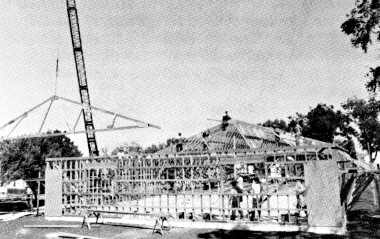
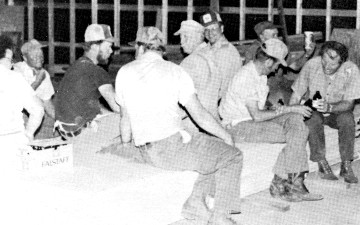
CELEBRATION IS A HUGE UNDERTAKING
The free pork barbecue has been a huge undertaking for
Aspinwall, with each event the result of hundreds of hours spent by volunteer workers.
Hams and pork shoulders are purchased from Farmland Foods; during the first 10 years, the meat had to be de-boned by the men, which was quite a chore and resulted in a number of cuts, some severe.
A group of women meet the night before the celebration to trim the meat and divide it into pieces of about five pounds each. The meat is seasoned with a combination of liquid smoke, salt, pepper, celery salt, savory salt, onion salt, garlic salt and red pepper. The meat is then wrapped in aluminum foil to be placed in the pit.
A pit, four feet deep, five feet wide and more than 30 feet long, is needed to cook the pork. It is fueled with cobs and wood which has been gathered in woodcutting bees, sawed, chopped, and brought to the pit area during the previous months. The fire is started on Friday morning and is kept going until a bed of coals about 2 feet deep is obtained. When the fire has simmered down, the meat is placed on the hot coals. This takes place about midnight or shortly after, because the meat has to cook at least 18 hours.
Although the pit is covered with sheet iron and sealed, one year there was a terrible rain storm in the early morning hours of the celebration and water seeped into the pit. Consequently, some of the meat did not get done and could not be used.
The streets are hosed down by the Manning Fire Department, and on Friday morning local farmers and townsmen gather to build stands for the concessions. Free lunch is served at the local pub for the workers.
Page 158
Members and spouses of two local clubs, the Happy Hour Club and the Tri-County Club (formerly the Friendly Hour Club), are the core of the serving line, which is open from 6 to 9 p.m. Crews from Manning, Manilla, Gray, and other area communities help the local workers man the other stands, most of which remain open until 2 a.m. Sunday.
Sunday morning is clean-up time. Stands are town down and put away for the next year's celebration, the garbage is hauled out, and the streets are washed down. Sandwiches saved from the night before are served for lunch.
An appreciation picnic is held shortly after the celebration for all workers and their families.

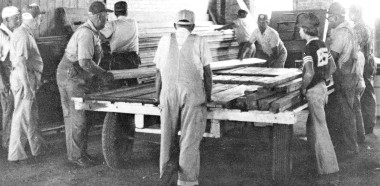
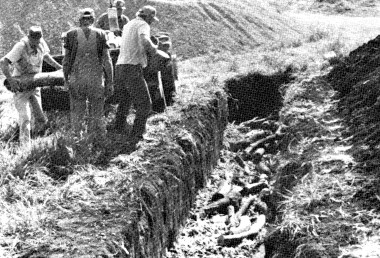
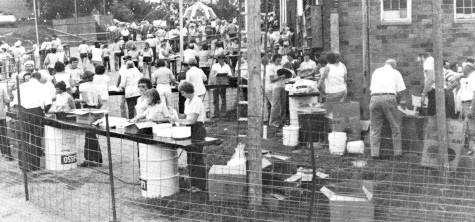
Page 159

ASPINWALL COMMUNITY CLUB AUXILIARY
The Aspinwall Community Club Auxiliary was organized March 2, 1978, by a group
of ladies from Aspinwall and the surrounding area. The
meetings are held once a month at the Community Building. The club's first
project to raise money was a bake sale held at the Union Gas office in Manning.
Phylis Ehlers was the first president and Betty Schroeder the first secretary-treasurer. Presidents in the succeeding years have been Arla Dammann and Corine Jahn, with Doris Witt as secretary-treasurer. In April, 1982, Irene Genzen took over the president's office.
The Auxiliary will serve wedding receptions and any other activities at the Community Building that they are asked to help with. Some of these have been the two soup suppers sponsored by the Centennial Committee, and a Sunday Coffee which was also a money-raising project for the Centennial.
Some of the club's projects to help benefit the Community Club have been buying kitchen supplies and equipment, buying more tables and chairs, and donating money toward the installation of an air-conditioner and the new entrance, added the winter of 1981. At Present, the club has 36 active members.
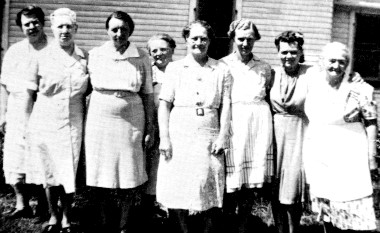
ODDS AND ENDS
Some evenings papa would go uptown and play cards.
Sometimes he would come home with a treat in his pocket for us, usually some
peanuts. Lizzie Boyens would come over and play cards with mama.
Malinda (Ehrichs) Anderson
ODDS AND ENDS
Some of our citizens had a notion of celebrating the
4th of July in Aspinwall and when a meeting was called to that effect, only
about 1/3 of the business men attended. They finally adjourned till some future
4th of July.
Manning Monitor, June 5, 1884
Page 160
HAPPY HOUR CLUB
A meeting of several women was held in Iola Stammer's
home with Erma Wiese as co-hostess, in May, 1948, for the purpose of forming a
social club. Deciding to include more members, an organizational meeting was
held in June, 1948, at Agnes Meggers' home. Women in an area two miles square,
each direction, from Iowa Township School No. 2 were eligible to join. The
third Thursday of each month was selected as the meeting day. Ten years later
the day was changed to the third Wednesday to avoid conflict with other clubs.
In later years, the boundary lines were lifted when members moved to town, so
that they could continue as members.
Charter members were: Fern Anthony, Helen Boell, Arla Dammann, Mabel Dammann, Irene Genzen, Marie Hagedorn, Alice Kuhl, Leola Kuhl, Lena Kuhl, Norma Lamaack, Irene Meggers, Agnes Meggers, Eunice Meggers, Goldie Meeves, Dorothy Rowedder, Berniece Stammer, Iola Stammer and Erma Wiese. Members joining later were: Dorothy Sharp, 1949; Lena Hass, 1949; Ruby Determan, 1953; Pauline Kruse, 1959; Vila Ranniger, 1959; Sharil Lamaack, 1966; Betty (Dammann) Schoba, 1966; Melvina Vollstedt, 1967; Carolyn Dammann, 1969; Deanna Dammann, 1971; Betty Schroeder, 1975; Malinda Dammann, 1976; Wynona Hill, 1979; and Colene Lohrmann, 1980. Irene Genzen was elected as the first president of the club.
The motto of the club is: "The secret of happiness is not in doing what one likes, but in liking what one has to do." The club colors are blue and white, and the flower is the red rose. The purpose of the club is the social interests of its members.
The Happy Hour Club was the first club to become involved with helping at the Aspinwall Celebration, and has been involved ever since.
Costume parties were once a popular feature of the club, and two that were held in Aspinwall were a beatnik party in the school and a comic strip characters party in the Co-op, which drew a lot of spectators. In addition to those two parties, dress ups included Jacob's Coat. Shipwreck, Halloween, Mother Goose, Bathing Suits, Easter Hats, Hula Skirts, a New Year's Baby in diapers, and a nightgown complete with hot water bottle and "thundermug."
Anniversaries are celebrated which are divisible by 5, and one special celebration was the Golden Anniversary of Ed and Lena Kuhl with a "This Is Your Life" program.
The Silver Anniversary of the club was celebrated in 1973 and the 30th in 1979.
Special features have been trips to Omaha, Sioux City, Des Moines, Carroll, Denison and Manning, touring various businesses; a trip to the Danish Mill; flower shows; cake decorating; craft demonstrations; a float in Manning's Diamond Jubilee; and a yearly club dinner out with husbands.
In earlier years, roads weren't the best, but our members traveled by team and wagon, and even walked when other transportation was unavailable. When the electricity went off at one anniversary celebration, the party continued with lanterns and candles.
The club has had 17 sons and a brother serve in the Armed Forces.
Donations have been made to worthy causes: Butternut coffee strips; Leanna Prill Kidney Fund; planting of shrubs and trees at the Manning Park, at the Hospital and Plaza; and some Christmas and Easter Seal drives. The club, at present, has 17 members and a limit of 18.

